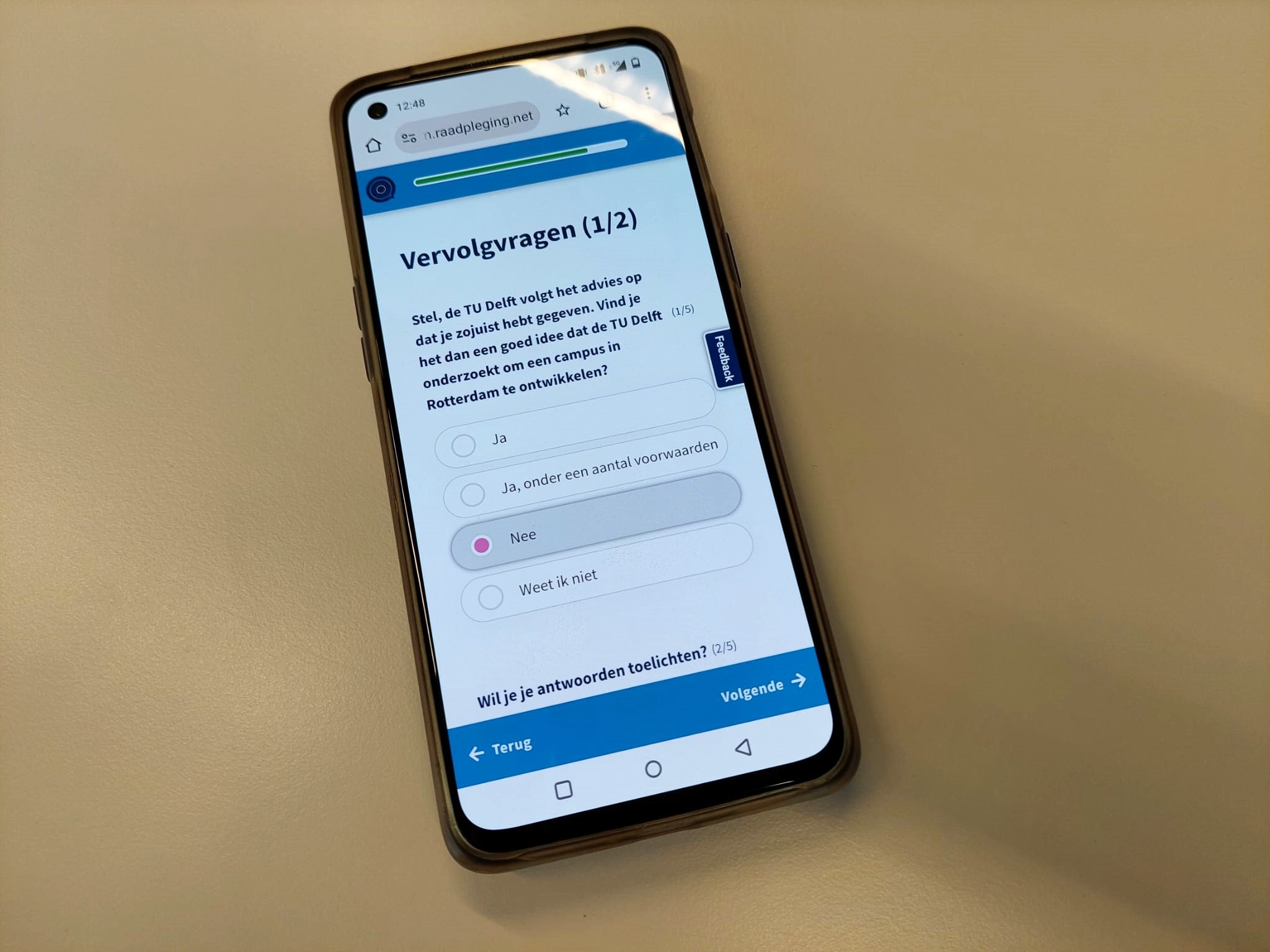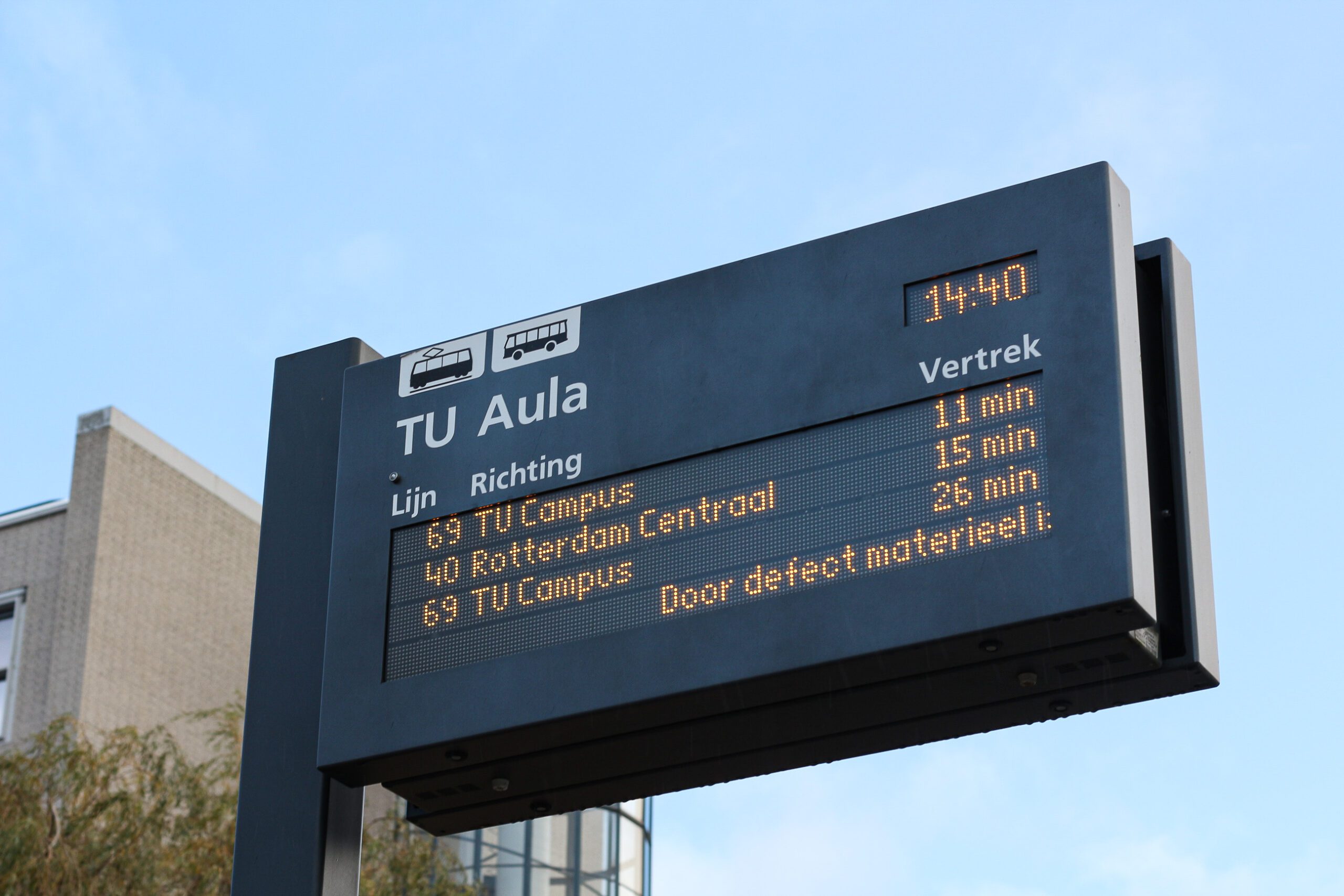TU Delft is currently seeking the opinions of students and staff members about a possible campus in Rotterdam through a participatory value evaluation (PVE). What is the purpose of this consultation? Delta dived into the questionnaire, the use of unique codes, and the timing of the survey.
(Photo: Justyna Botor)
‘What objectives should be prioritised in the plans for Rotterdam Campus?’ This is the first question that staff and students are asked in the Participatory Value Evaluation (PVE), an online TU Delft consultation composed by Populytics, a spinoff of TU Delft. But wait a minute – is the campus definite already? The accompanying email refers to exploring thoughts about Rotterdam, while the sentence formulation suggests that the green light has already been given to make plans.
Looking further at the questionnaire, something else jumps out. The respondents who do not think it is a good idea to establish a campus in Rotterdam immediately receive a warning. ‘Not having a new campus outside Delft could mean that certain degree programmes will not be able to grow in the future or that no new degree programmes can be created.’ Those who answered positively about the Rotterdam Campus do not see any similar mentions of consequences.
So how neutral are the questions? Is the questionnaire really anonymous? And has it taken the recently announced cutbacks into account? The Works Council does not want money to be spent on ‘expensive studies’ as it views the plans as ‘financially unrealistic’. Delta asked Niek Mouter, Associate Professor at the Faculty Technology, Policy and Management and co-founder and Scientific Director of Populytics, seven questions.
Why are the questions directly about prioritising objectives at Rotterdam Campus instead of first assessing whether there is support for an expansion like this?
Mouter: “The order of the questions depends on the purpose of the PVE and on the timing of the survey. Research shows that the support for a plan strongly depends on the details and effects of a plan. If I would say ‘let’s go to Spain for a holiday’ to my family, they would say ‘good idea’. If I would say ‘let’s go to place X in Spain for a holiday. There is nothing for children to do there, it’s very windy, and the crime rates are high’, they would say ‘no, let’s stay at home’. So a question like ‘What do you think about expanding to Rotterdam?’ at an early stage gives little information unless there are details. It is better to explore the priorities, values and concerns of staff members and students. This helps the policymakers better check their plans with others and avoid blind spots. You can gauge the support later, with the concrete plans. But there are often better methods of doing this than a PVE.”
Why are the potential negative effects of a ‘no’ answer explicitly stated, but not in the case of ‘yes’ answers?
“The respondents who answer ‘yes’ can state their conditions in an open question. They did this en masse and this generated valuable considerations for the Rotterdam Campus programme team. Apart from this, it turned out to be useful for the team to obtain more information about whether the preferences for a Rotterdam Campus would be influenced by two consequences. This is why we presented this to the people who said ‘no’. There could of course have been more questions added for the people who said ‘yes’, apart from giving them the chance to state their conditions. But while there could have been more questions for them, longer PVEs limit the diversity of respondents. The middle road shows both a wide range of yes and no sayers, and the middle group.”

(Photo: Marjolein van der Veldt)
The space for respondents to state their displeasure about the plans Rotterdam Campus is limited to just one open question. Why did you choose to do this?
“The respondents can express their displeasure in three open questions. First, they can say that they do not think it is a good idea for TU Delft to investigate an option for a campus in Rotterdam and they can explain why. Second, the respondents are asked about their concerns. And third, they can give additional suggestions. This allows us to see the broad range of concerns and objections. In our experience, answering open questions sometimes raises new values, concerns and objections that policymakers are not yet aware of. This is an advantage compared to closed questions. In general citizen surveys, about 60% of respondents fill in open questions, but in academic circles this is closer to 80%. We saw this in the previous PVE about partnerships in the fossil fuel industry, and in this PVE even 85% filled in the open questions.”
In connection with the recent news about cutbacks, did you think about including a question about this? Or about issuing the questionnaire at another point in time?
“We could have included another question about this, but long questionnaires have less diversity in the answers. We know from experience that shorter PVEs have more respondents with a wider range of ideas. By the way, the cutbacks are mentioned in the answers to the question about conditions. Participatory research also works best if the plans are still in the development phase so that the input can be processed on time. While we cannot say anything about the outcomes, we already see new ideas, conditions and objections. It is better for the planners to know and include these now.”
How will the neutrality of the questionnaire be guaranteed?
“We take full responsibility for the design and content of the questionnaire. We thus guarantee that the body wanting a questionnaire does not set any demands that may affect the quality of the research. Various people have seen the questions beforehand, such as the Rotterdam Campus programme team and the Works Council. However, this does not mean that we adopted any changes that they suggested as it is up to us to decide on the content.”
The respondents receive a unique code through their TU Delft email address which gives them access to the questionnaire. Is the questionnaire really anonymous?
“By using a unique code, we can make sure that only TU Delft staff members and students can take part. Populytics knows the codes that were issued, but not the email addresses that they were connected to. The PVE thus remains anonymous.”
The unique codes can be used several times or be replaced by random combinations of letters and numbers. How can you check that the questionnaire was not filled in by the same respondents filling it in several times?
“We only include the issued codes in the analysis. Any questionnaires that were registered through a random combination of letters and numbers are not included in the analysis. And we only include a unique code in the analysis once.”
- Students and employees can participate in the online consultation until 6 March. The findings of the Rotterdam Campus PVE will be handed over to the Rotterdam Campus programme team at the end of March.
Do you have a question or comment about this article?
m.vanderveldt@tudelft.nl


Comments are closed.